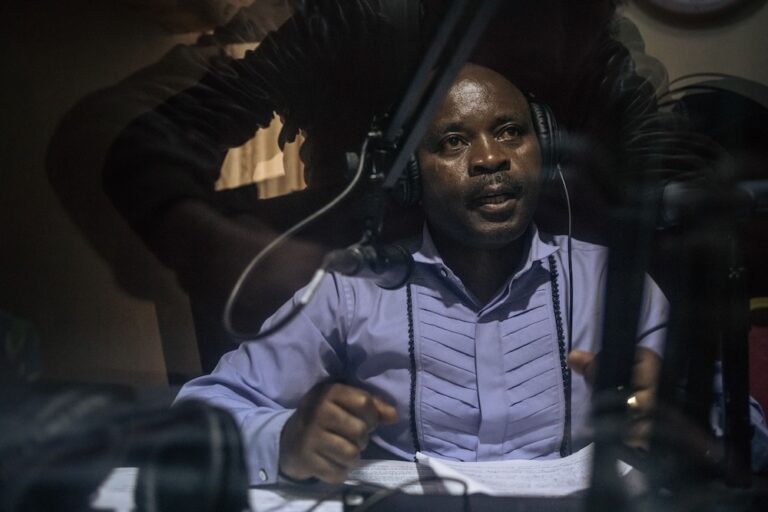(JED/IFEX) – The following is an abridged 21 November 2007 JED statement: JED denounces prolonged closure of some 30 radio and TV stations and the barely-veiled desire to silence bothersome media JED is shocked by the statements made by Information, Press and National Communications Minister Toussaint Tshilombo Send during the “Questions d’actualités” programme broadcast on […]
(JED/IFEX) – The following is an abridged 21 November 2007 JED statement:
JED denounces prolonged closure of some 30 radio and TV stations and the barely-veiled desire to silence bothersome media
JED is shocked by the statements made by Information, Press and National Communications Minister Toussaint Tshilombo Send during the “Questions d’actualités” programme broadcast on 20 November 2007 on the publicly-owned Radiotélévision nationale congolaise (RTNC).
JED is particularly scandalised and shocked by the casual responses given by the minister to justify the ban, which has been in place for more than a month, on 38 Kinshasa-based radio and television stations and by the delay in re-opening the media outlets that have put their status in order.
Asked about the motivations for his 20 October ministerial decree banning the stations, Tshilombo admitted that the decision to “clean up the profession” goes back to a government meeting on 24 March, the day after armed confrontations between members of the Congolese Armed Forces (FARDC) and guards of the former vice-president, Jean-Pierre Bemba. To justify this “cleanup”, the minister cited the absence in these companies’ files of either operating licences, receipts delivered by his ministry or proof of payment of the administrative taxes to which press outlets are subject.
Soon after the announcement of this controversial measure, it was revealed that although some media outlets had incomplete administrative files, others, who said they had the documents and proof demanded of them, were targeted unfairly. And during the last month, those with incomplete files have regularised their administrative or tax status by negotiating new repayment schedules, according to information obtained by JED.
Nevertheless, the minister has still not lifted the ban. Responding to questions about this administrative anomaly, the minister said during the programme that he had launched an appeals commission that is to submit its conclusions in a month. He also threatened to permanently shut down certain stations that have not put their status in order within the two-month period granted to the commission. “In any case, our objective would be to keep no more than 10 stations,” he said.
JED notes that:
– The information minister’s decision appears clearly today to be the fulfillment of a political decision taken by the government, following the clashes in Kinshasa on 22 and 23 March, to punish a segment of the press wrongly accused at the time of “playing a harmful role” in triggering the events in the capital.
– The prolonged closure of these stations, despite the regularisation of their administrative files, confirms the political desire to silence bothersome media outlets.
– The two months granted to the appeals commission to submit its conclusion also apparently aims to prolong the suspension of media outlets in order to exclude them from sharing in the 2 million dollars in the 2007 budget for public aid to the press.
Facing this measure that reveals an anachronistic vision of the right to information, which is guaranteed by the country’s constitution, JED calls on the representatives of the people gathered in Parliament to stop this move backwards for freedom of expression and free enterprise less than a year after the elections. JED also asks Minister Tshilombo to end this “taking of hostages” in the private media to serve hidden partisan interests.


